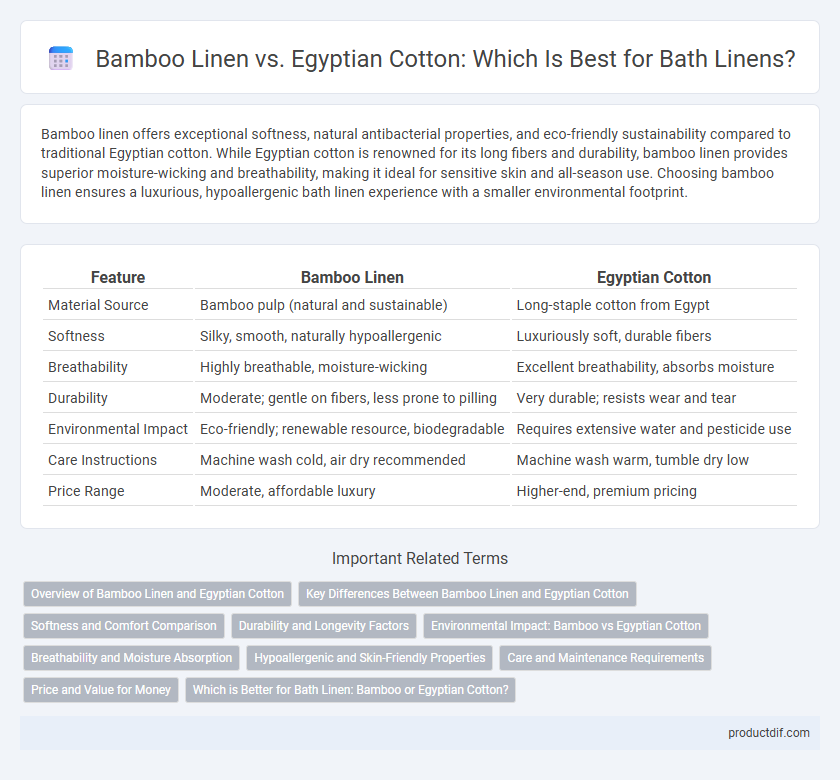Bamboo linen offers exceptional softness, natural antibacterial properties, and eco-friendly sustainability compared to traditional Egyptian cotton. While Egyptian cotton is renowned for its long fibers and durability, bamboo linen provides superior moisture-wicking and breathability, making it ideal for sensitive skin and all-season use. Choosing bamboo linen ensures a luxurious, hypoallergenic bath linen experience with a smaller environmental footprint.
Table of Comparison
| Feature | Bamboo Linen | Egyptian Cotton |
|---|---|---|
| Material Source | Bamboo pulp (natural and sustainable) | Long-staple cotton from Egypt |
| Softness | Silky, smooth, naturally hypoallergenic | Luxuriously soft, durable fibers |
| Breathability | Highly breathable, moisture-wicking | Excellent breathability, absorbs moisture |
| Durability | Moderate; gentle on fibers, less prone to pilling | Very durable; resists wear and tear |
| Environmental Impact | Eco-friendly; renewable resource, biodegradable | Requires extensive water and pesticide use |
| Care Instructions | Machine wash cold, air dry recommended | Machine wash warm, tumble dry low |
| Price Range | Moderate, affordable luxury | Higher-end, premium pricing |
Overview of Bamboo Linen and Egyptian Cotton
Bamboo linen is derived from the cellulose fibers of the bamboo plant, known for its naturally antibacterial properties, moisture-wicking ability, and eco-friendly cultivation. Egyptian cotton, prized for its extra-long staple fibers, offers exceptional strength, softness, and durability, making it a premium choice for luxurious bath linen. Both materials provide unique benefits, with bamboo linen excelling in sustainability and breathability, while Egyptian cotton emphasizes softness and longevity.
Key Differences Between Bamboo Linen and Egyptian Cotton
Bamboo linen is highly absorbent and naturally antimicrobial, making it ideal for bath linens that dry quickly and resist odors, while Egyptian cotton boasts long, luxurious fibers providing exceptional softness and durability. Bamboo linen is eco-friendly due to its sustainable cultivation and biodegradability, whereas Egyptian cotton requires more water and chemical inputs despite its premium quality. The price point for Egyptian cotton bath linens tends to be higher, reflecting its luxury status, while bamboo linen offers a cost-effective, environmentally conscious alternative without compromising comfort.
Softness and Comfort Comparison
Bamboo linen offers superior softness due to its naturally smooth fibers, providing a silky feel that enhances comfort during use. Egyptian cotton is renowned for its long, fine fibers, resulting in a plush texture that is both durable and breathable. Comparing softness and comfort, bamboo linen excels in moisture-wicking properties and hypoallergenic benefits, while Egyptian cotton delivers a luxurious and sturdy touch ideal for everyday bath linen.
Durability and Longevity Factors
Bamboo linen offers exceptional durability due to its naturally strong and flexible fibers, which resist wear and tear over time. Egyptian cotton, renowned for its long staple fibers, provides superior strength and longevity, maintaining its softness and integrity after multiple washes. Both materials excel in durability, but Egyptian cotton typically outlasts bamboo linen in heavy-use bath linen applications.
Environmental Impact: Bamboo vs Egyptian Cotton
Bamboo linen offers significant environmental advantages over Egyptian cotton due to its rapid growth rate and lower water consumption, requiring up to 70% less water. Egyptian cotton farming typically involves extensive irrigation and pesticide use, contributing to soil degradation and higher carbon emissions. Bamboo's natural biodegradability and minimal need for chemicals make it a more sustainable choice for eco-conscious consumers seeking bath linen options.
Breathability and Moisture Absorption
Bamboo linen offers superior breathability due to its micro-gaps and natural ventilation properties, making it highly effective at regulating temperature and promoting airflow. Its moisture-wicking capability outperforms Egyptian cotton, as bamboo fibers absorb up to 40% more water, quickly drawing moisture away from the skin to keep users dry. While Egyptian cotton is known for softness and durability, bamboo linen excels in breathability and moisture absorption, ideal for hot and humid climates.
Hypoallergenic and Skin-Friendly Properties
Bamboo linen is renowned for its natural hypoallergenic properties, making it highly suitable for sensitive skin and reducing the risk of irritation or allergies. Egyptian cotton, known for its long fibers and softness, offers excellent breathability but may not be as inherently hypoallergenic as bamboo fibers. Choosing bamboo linen can provide enhanced skin-friendly benefits due to its moisture-wicking and antimicrobial qualities, ideal for individuals with eczema or sensitive skin conditions.
Care and Maintenance Requirements
Bamboo linen requires gentle machine washing in cold water and air drying to maintain its natural softness and absorbency. Egyptian cotton bath linen benefits from warm water washing and can be tumble dried on low heat, preserving its long fibers and durability. Both materials avoid bleach and fabric softeners to extend the lifespan of the bath linen and maintain optimal softness and absorbency.
Price and Value for Money
Bamboo linen typically offers a lower price point than Egyptian cotton, making it a budget-friendly option for quality bath linens. In terms of value for money, Egyptian cotton is often favored for its superior softness, durability, and long-term performance, justifying the higher cost. Bamboo linen excels in moisture-wicking and antibacterial properties, providing excellent comfort and sustainability benefits at a competitive price.
Which is Better for Bath Linen: Bamboo or Egyptian Cotton?
Bamboo linen offers exceptional softness, moisture-wicking properties, and natural antibacterial benefits, making it ideal for sensitive skin and quick drying in bath linen. Egyptian cotton is renowned for its long staple fibers, durability, and luxurious feel, providing plushness and longevity in towels and bathrobes. Choosing between bamboo and Egyptian cotton bath linen depends on preferences for eco-friendliness and softness with bamboo or superior strength and traditional luxury with Egyptian cotton.
Bamboo linen vs Egyptian cotton Infographic

 productdif.com
productdif.com